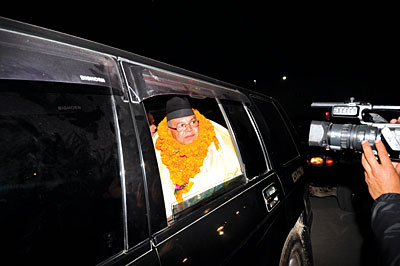 BIKRAM RAI |
The cynics will be gratified by Prime Minister Jhala Nath Khanal's struggles to cobble together a coalition with his Maoist backers, following his unlikely victory in last week's election. The ongoing brouhaha over the secret seven-point understanding between Khanal and Maoist Chairman Dahal has rendered the highway of leftist solidarity into something of a quagmire. Unfortunately, it is the peace process and constitution writing that are mired; Dahal and Khanal will no doubt find ways to spin their way out.
It's hard to decide what's more incredible about the seven-point deal: the manner in which it came about, or its actual contents. The fact that the leader of a supposedly democratic party can even think of inking such a deal without consulting his own party colleagues (let alone his party's erstwhile coalition allies, Nepali Congress) is disturbing to say the least.
As for the contents, two points in particular offend. The deal implies that the Maoists and UML will take turns to lead government (despite Khanal's backtracking in a subsequent interview with BBC Nepali). This has even led some to suspect that Khanal intends to resign to make way for Dahal just before the 28 May deadline, thereby handing him power at a critical stage, and setting the stage for Maoist rule at a time when no provisions have been made for either a further extension of the CA or fresh elections.
Conjecture aside, the other point that raised the hackles of all non-Maoist parties (including UML) was the 'agreement' on a separate security force composed solely of Maoist ex-combatants, or ex-combatants and members of other state security forces. While this would serve the Maoists very well indeed, there is no way that any other political force in the country will willingly agree to what is virtually the resurrection of the PLA.
One might argue that in reality the hardcore of the PLA is actually the YCL, but what is to stop such a separate force recruiting YCL members and other Maoist cadre to maintain its revolutionary character and edge out the influence of the state? Once again, it is only natural for Chairman Dahal to angle for the formation of such a force. For Khanal to do so is an admission of the polity's failure to agree on integration into any or all three existing state security forces (of which the APF came into being only because of the need to combat the Maoists, and which would cease to have a raison d'etre if the Maoists dissolved their own military forces). It is also terribly poor judgment.
It is not Khanal's 'self-criticism' and weak statements that the contents of the deal were 'just a proposal' that will sink the coalition before it pushes out to sea. It is, as ever, Khanal and Dahal's single-minded lust for power (one ingenuous, the other manipulative, but both wholly destructive), that has done the job.
So what lies ahead for Khanal's government? At the time of going to press, there is still the possibility that UML and the Maoists will come to an agreement on government formation. They will most likely then proceed by the spirit if not the letter of the infamous seven-point deal. Whether they will make any progress towards conclusion of the peace process and constitution-writing will depend largely on whether UML leaders can channel their errant leader appropriately, and whether NC leaders have it in them to make the best of a bad situation in part of their own making.
READ ALSO:
Trial by fire, PRASHANT JHA
The goose strikes back, DAMAKANT JAYSHI
Khanal the Trojan, KANAK MANI DIXIT


